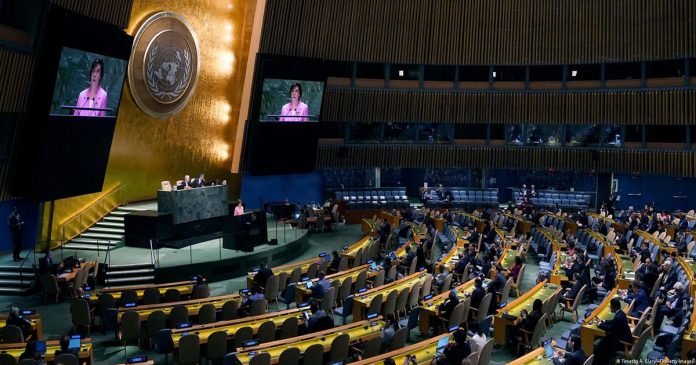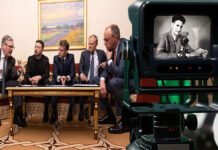On the eve of Russia’s invasion of Ukraine, roughly three-quarters of UN member states endorsed a resolution calling for “just and lasting” peace. China and India were among the major abstentions.
UN General Assembly members on Thursday voted in favour of a motion put forward by Germany calling for peace in Ukraine as soon as possible.
The U.N. General Assembly approved a nonbinding resolution Thursday that calls for Russia to end hostilities in Ukraine and demands the withdrawal of its forces, sending a strong message on the eve of the first anniversary of the invasion that Moscow’s aggression must end.
In all, 141 countries voiced support for the resolution. Seven opposed it — Russia, Belarus, North Korea, Syria, Mali, Eritrea, and Nicaragua.
Another 32 countries abstained during the vote. China, India, South Africa, Pakistan, Sri Lanka, and much of Africa and Central Asia were among them.
The UN General Assembly adopted a resolution that demands #Russia leave #Ukraine.
— UN News (@UN_News_Centre) February 23, 2023
In favour: 141
Against: 7
Abstentions: 32 pic.twitter.com/WnEoRp94kx
The level of support was similar to comparable previous General Assembly votes relating to Russia’s invasion of Ukraine. Mali and Eritrea moved from abstaining to voting against the resolution; western hopes of potentially swaying India’s vote at the last were dashed.
South Sudan, however, moved from past abstentions on the conflict to voting in favor of the motion, with its delegate saying this was partly because of the country’s own recent legacy of civil war and the UN’s role in helping to defuse it.
General Assembly resolutions are not binding and carry mainly symbolic weight at the United Nations. However, unlike at the Security Council, Russia cannot unilaterally veto them.
What’s in the draft resolution?
As well as calling on parties to the conflict and the international community to seek to broker peace, the resolution also calls for Russia to withdraw from Ukraine’s territory.
The document “reaffirms its commitment to the sovereignty, independence, unity and territorial integrity of Ukraine within its internationally recognized borders, extending to its territorial waters.”
The measure also “reiterates its demand that the Russian Federation immediately, completely and unconditionally withdraw all of its military forces from the territory of Ukraine within its internationally recognized borders, and calls for a cessation of hostilities.”
The resolution does not go into any details on how peace or peace negotiations might be achieved, short of saying through member states and international organizations “redoubling” their efforts.
It also calls for war crimes perpetrators to face international prosecution.
China, Hungary question enthusiasm for peace talks
Hungary’s Foreign Minister Peter Szijjarto, meanwhile, appeared to appeal to western countries to put more of their efforts into securing peace negotiations rather than either arming Ukraine or sanctioning Russia. He noted Hungary’s efforts welcoming refugees fleeing the war.
“Based on our experience, it became already pretty obvious that neither delivery of weapons, nor sanctions, those measures do not save lives. To the contrary, they contribute to the prolongation and the risk of escalation of this war, and they bring more suffering,” Szijjarto said.
Hungary is a NATO and EU member that nevertheless maintains cordial ties with Russia. Szijjarto said the international community should “concentrate” on “finally launching peace talks as soon as possible.”
China’s deputy ambassador to the UN, Dai Bing, said that peace talks should be the international community’s priority. Echoing comments from China at the Munich Security Conference, Dai said that China regretted that initial negotiations between Kyiv and Moscow had stalled.
“Dialogue and negotiation is the only viable way to resolve the Ukraine crisis,” Dai said. “At the beginning of the crisis, Russia and Ukraine held several rounds of talks and made important progress. Regrettably, peace talks have since stalled. The reasons behind this warrant deep reflection.”
In Munich, China’s top diplomat Wang Yi appeared to imply, albeit without naming names, that the US or its allies did not want those talks to continue.
South Africa, another contentious abstainer in past votes, asked whether the past UN resolutions had sought to halt the fighting or rather to condemn Russia.
“As we have asked this Assembly before, are our ways and actions focused on the maintenance of peace, or creating further divisions that make the attainment of immediate peace less likely?” South Africa’s UN Ambassador Mathu Joyini asked.
She said the resolution “brings us brings us no closer to laying the foundations for a durable peace and bringing an end to the devastation and destruction,” arguing that “what we need is a firm, unequivocal commitment to peace from all parties.”
Anniversary prompts diplomatic flurry
The special session kicked off on Wednesday. UN Secretary-General Antonio Guterres, Ukrainian Foreign Minister Dmytro Kuleba and Russia’s ambassador to the United Nations Vasily Nebenzya were among the most notable speakers.
Russia’s UN ambassador Nebenzya called on members to oppose the motion, arguing it was one-sided. He also accused Ukraine’s NATO allies of exacerbating the conflict, claiming there were parallels to World War II.
Support Independent Journalism Today
Our unwavering dedication is to provide you with unbiased news, diverse perspectives, and insightful opinions. We're on a mission to ensure that those in positions of power are held accountable for their actions, but we can't do it alone. Labour Heartlands is primarily funded by me, Paul Knaggs, and by the generous contributions of readers like you. Your donations keep us going and help us uphold the principles of independent journalism. Join us in our quest for truth, transparency, and accountability – donate today and be a part of our mission!
Like everyone else, we're facing challenges, and we need your help to stay online and continue providing crucial journalism. Every contribution, no matter how small, goes a long way in helping us thrive. By becoming one of our donors, you become a vital part of our mission to uncover the truth and uphold the values of democracy.
While we maintain our independence from political affiliations, we stand united against corruption, injustice, and the erosion of free speech, truth, and democracy. We believe in the power of accurate information in a democracy, and we consider facts non-negotiable.
Your support, no matter the amount, can make a significant impact. Together, we can make a difference and continue our journey toward a more informed and just society.
Thank you for supporting Labour Heartlands












